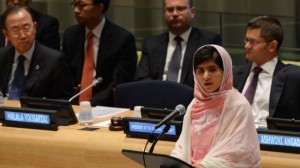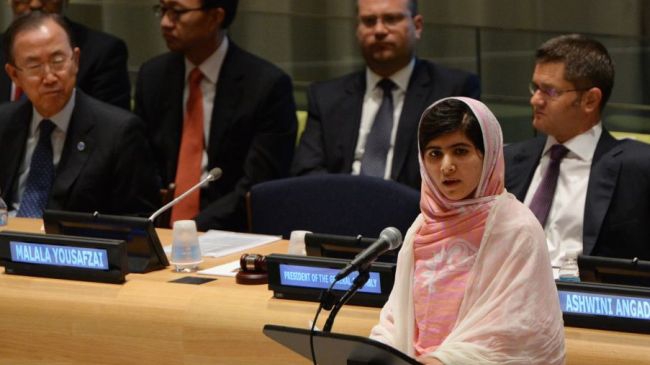 Pakistani activist Malala Yousafzai speaks before the United Nations Youth Assembly at UN headquarters in New York on July 12, 2013.[/caption]
Pakistani activist Malala Yousafzai speaks before the United Nations Youth Assembly at UN headquarters in New York on July 12, 2013.[/caption](Reuters) - Malala Yousafzai, the Pakistani girl who was shot in the head by the Taliban last year for demanding education for girls, marked her 16th birthday with a passionate speech at the United Nations on Friday in which she said education could change the world.
"Let us pick up our books and pens. They are our most powerful weapons. One child, one teacher, one pen and one book can change the world. Education is the only solution," said Yousafzai, speaking out for the first time since she was attacked.
Wearing a pink head scarf, Yousafzai told U.N. Secretary-General Ban Ki-moon and nearly 1,000 students attending an international Youth Assembly at U.N. headquarters in New York that education was the only way to improve lives.
Yousafzai was shot at close range by gunmen in October as she left school in Pakistan's Swat Valley, northwest of the country's capital Islamabad. She was targeted for her campaign against the Islamist Taliban efforts to deny women education.
"They shot my friends too. They thought that the bullets would silence us. But they failed and out of that silence came thousands of voices," she said to cheers from the students gathered at U.N. hall.
"The terrorists thought they would change my aims and stop my ambitions, but nothing changed in my life except this: weakness, fear and hopelessness died. Strength, power and courage was born," a confident Yousafzai said.
She wore a white shawl draped around her shoulders that had belonged to former Pakistani Prime Minister Benazir Bhutto, who was assassinated during a 2007 election rally weeks after she returned to�Pakistan�from years in self-imposed exile.
"I am not against anyone, neither am I here to speak in terms of personal revenge against the Taliban or any other terrorist group. I'm here to speak up for the right of education for every child," she said.
"I want education for the sons and daughters of the Taliban and all terrorists and extremists," she said. "I do not even hate the talib who shot me. Even if there is a gun in my hand and he stands in front of me, I would not shoot him."
Yousafzai presented Ban with a petition signed by some 4 million people in support of 57 million children around the world who are not able to go to school. It demanded that world leaders fund new teachers, schools and books and end child labor, marriage and trafficking.
Ban said that the United Nations was committed to a target of getting all children in school by the end of 2015.
"No child should have to die for going to school. Nowhere should teachers fear to teach or children fear to learn. Together, we can change this picture," he said. "Together, let us follow the lead of this brave young girl, Malala."
TIRED OF WAR
U.N. Special Envoy for Global Education, former British Prime Minister Gordon Brown, said Friday's event was not just a celebration of Malala's birthday and of her recovery, but of her vision.
He invoked "her dream that nothing, no political indifference, no government inaction, no intimidation, no threats, no assassin's bullets should ever deny the right of every single child ... to be able to go to school."
Brown described Yousafzai's recovery from the attack as a miracle. The teenager was treated in Pakistan before the United Arab Emirates provided an air ambulance to fly her to Britain, where doctors mended parts of her skull with a titanium plate.
Unable to safely return to Pakistan, Yousafzai enrolled in a school in Birmingham, England in March. Her mother wiped away tears on Friday as she watched her daughter thank all those who helped save her life.
Pakistan has 5 million children out of school, a number only surpassed by Nigeria, which has more than 10 million children out of school, according to the U.N. cultural agency UNESCO.
The Taliban claimed responsibility for the assassination attempt on Yousafzai, calling her efforts pro-Western. Two of her classmates were also wounded.
The Pakistan Taliban, formally called the Tehreek-e-Taliban Pakistan (TTP), formed in 2007, is an umbrella group uniting various militant factions operating in the volatile northwestern tribal areas along the porous border with�Afghanistan.
Under Taliban rule in neighboring Afghanistan from 1996 to 2001, women were forced to cover up and were banned from voting, most work and leaving their homes unless accompanied by a husband or male relative.
"The extremists were and they are afraid of books and pens, the power of education frightens them. They are afraid of women," Yousafzai said. "When we were in Swat ... we realized the importance of pens and books when we saw the guns."
By Reuters
The Iran Project is not responsible for the content of quoted articles.











